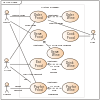Profile diagram
Appearance

| UML diagram types |
|---|
| Structural UML diagrams |
| Behavioral UML diagrams |
In Unified Modeling Language
in the field of software engineering,
a profile diagram[1]
operates at the metamodel level to show stereotypes as classes with the «stereotype» stereotype, and profiles as packages with the «profile» stereotype.[2] The extension relation (solid line with closed, filled arrowhead) indicates what metamodel element a given stereotype is extending.
History
[edit]The profile diagram did not exist in UML 1. Other diagrams had been used to display this issue.[2] It was introduced with UML 2 to display the usage of profiles.[1]
See also
[edit]References
[edit]- ^ a b "Profiles". Unified Modeling Language 2.5.1. OMG Document Number formal/2017-12-05. Object Management Group Standards Development Organization (OMG SDO). December 2017. p. 252.
- ^ a b Bernd Österreich (2009). Analyse und Design mit UML 2.3 - Objektorientierte Softwareentwicklung (in German) (9 ed.). Munich: Oldenburg. p. 334. ISBN 978-3-486-58855-2.
External links
[edit]- Christoph Kecher: "UML 2.0 - Das umfassende Handbuch" Galileo Computing, 2006, ISBN 3-89842-738-2

